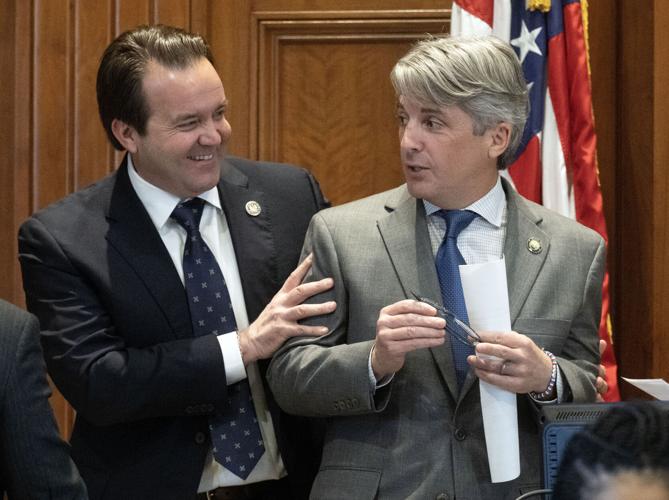Here’s a lesson from the news last week that legislative leaders are taking a fresh look at Gov. Jeff Landry’s rejection of a federally funded summer program to help make sure that children who qualify for meals during the academic year don’t go hungry while school’s out: These politicians have heard all the criticism for this mean-spirited and illogical decision, and they’re listening.
House Speaker Phillip DeVillier, R-Eunice, basically admitted as much at a Public Affairs Research Council meeting last week. DeVillier said that lawmakers are looking to appropriate the $3.5 million state cost, which would unlock $71 million in federal funds — quite a return on investment any way you count it.
“The summer EBT program. ... When I go back home and talk to my constituents, they do believe it's something that they would like us to try to fund,” DeVillier said. He added that he’s been talking about the issue with Democratic Caucus Chair Matthew Willard, D-New Orleans, who had just made an impassioned plea before the PAR event attendees for reconsideration.
Senate President Cameron Henry, R-Metairie, said he too is on board, and that “we’re closer than people think.”
“There seems to be a general consensus among members trying to figure out why we wouldn’t do it,” Henry said afterward.
So for their sake and everyone else’s, let’s revisit what the Landry administration said when it joined other Republican-led states in refusing to accept the money from the Biden administration. (The deadline to accept the money has passed, but the feds have signaled a willingness to accommodate exceptions).
“Every child deserves a safe home, first and foremost, and families deserve a pathway to self-sufficiency. That is our primary mission,” Department of Children and Family Services Secretary David Matlock said. “Staying focused on that mission, without adding piecemeal programs that come with more strings than long-term solutions, is what will deliver the biggest impact for the children and families we serve.”
The reaction from some politicians was swift and fierce. The Legislative Black Caucus called it a “shocking move” that “not only jeopardizes the well-being of vulnerable individuals but also raises serious ethical concerns.” New Orleans City Council President Helena Moreno asked if individual cities could tap into the money that the state was rejecting.
But until now, most of the public criticism has come from Democrats.
The PAR event revealed an encouraging development: That despite Matlock’s ideologically loaded language — self-sufficiency for children and federal aid coming with too many strings — Republican lawmakers and their constituents get what’s really going on here and care about it.
That really shouldn’t come as a surprise, given the strong moral case for accepting the money. Roughly a quarter of Louisiana children live in poverty, and this money — $40 a month per child for three months — would help fill the summer gap left by school feeding programs for some 594,000 kids from hard-pressed families. Research shows that hungry kids don’t thrive, so providing this help sets students up for success once classes resume.
There’s also the practical case for participating. It’s paid for with money sent to the federal government by all taxpayers, including Louisiana’s; if Louisiana takes a pass, then its residents are feeding kids in other states but not at home.
Plus, as Henry noted, “People will go buy food with that ... in Louisiana. So it’s a $70 million infusion into Louisiana fueled by food.”
Or it will be, if the money actually makes it here. That, at this point, is not entirely clear.
Henry suggested the administration’s initial explanation for rejecting the money doesn’t cut it with lawmakers.
“We as members just want to know what (Landry’s) thought process is and why you wouldn’t do it and see if we agree,” he said. If they do, he said they’ll stand down. If not, they’ll look at putting the local match into the budget they’ll pass later in the session.
Even then, there’s the procedural question of whether Landry would have to reverse his initial call; if he’s required but not inclined to, Henry said it doesn’t make sense for lawmakers to appropriate the money.
As for where Landry stands, his spokesperson Kate Kelly had this to say: “There has been a significant amount of false information on Louisiana’s commitment to summer food programs. Without the program and without the need for additional money, Louisiana will serve over 1 million more meals in the summer of 2024 than in the summer of 2023, and Louisiana will serve 3 million more meals this summer than pre-pandemic summers. However, the Legislature has control of the purse strings. It’s their right to appropriate money as they wish.”
Which suggests the ultimate fate of the summer EBT program is still up in the air.
Should the governor have a change of heart, though, he’d have plenty of cover. DeVillier and Henry are conservative Republicans just like him. And another red state governor, Nebraska’s Jim Pillen, changed course in February, after meeting with low-income children who described what it’s like going hungry.
Seems like a little listening can go a long way — for those who are willing.



